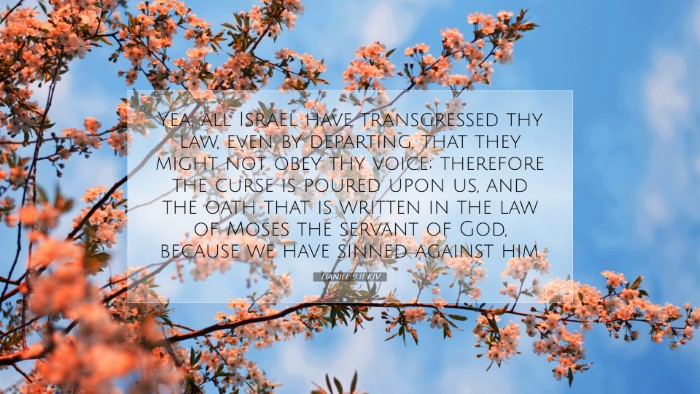Commentary on Daniel 9:11
Verse: "Yea, all Israel have transgressed thy law, even by departing, that they might not obey thy voice; therefore the curse is poured upon us, and the oath that is written in the law of Moses the servant of God, because we have sinned against him."
Introduction
This verse from Daniel 9:11 serves as a poignant reminder of the consequences of national sin and the importance of obedience to God's commandments. It encapsulates the heart of Daniel’s prayer of confession and an acknowledgment of Israel’s historical failure to uphold the covenant with God. This commentary synthesizes insights from notable public domain scholars to provide a thorough exploration of the verse's theological, historical, and practical implications.
Theological Insights
Daniel’s acknowledgment of Israel’s transgressions serves to illustrate the communal nature of sin. It emphasizes the concept that individual sins contribute to the collective guilt of the nation. Matthew Henry points out that Israel’s departure from God's law is not merely a social failing but a significant spiritual offense that provoked divine wrath. The expression “the curse is poured upon us” is indicative of the covenantal framework wherein blessings and curses are contingent upon Israel’s obedience (Deuteronomy 28).
Albert Barnes highlights the implications of “the curse” being a direct result of turning away from God. He expounds that the acknowledgment of sin is the first step toward restoration and revival. In this light, confessing transgressions is not just an act of guilt but also a pathway to seeking God's mercy and favor once again.
Similarly, Adam Clarke articulates that the “oath written in the law of Moses” refers to the covenant stipulations that outline the blessings of obedience and the curses of disobedience. Clarke notes that the law serves as both a guide and a witness against Israel’s failure, demonstrating the serious nature of their covenant obligations.
Historical Context
Understanding the historical backdrop is essential for appreciating the gravity of Daniel’s prayer. The Israelites had experienced prolonged exile as a direct consequence of their idolatry and rebellion against God. In the context of Daniel 9, Daniel is praying at a time when the Babylonian captivity was nearing its end. His plea embodies a profound sense of mourning for the sins of the people and a hope for restoration.
Matthew Henry reminds readers that the context of exile highlights God’s righteousness in administering justice while also showcasing His mercy in providing a path to repentance. The mention of “all Israel” signifies that the sins committed were not isolated to a few individuals but permeated the entire community, further reinforcing the need for collective repentance.
Spiritual Application
Daniel 9:11 calls for a reflection not only on corporate sin but also on personal responsibility. It urges readers—pastors, theologians, and students alike—to evaluate their own lives in relation to God's statutes. Albert Barnes emphasizes that recognizing and confessing sin is paramount in the believer’s life; it paves the way for spiritual renewal and divine intervention.
Adam Clarke also points out that personal confession should be coupled with a sincere desire for transformation. The sins of a community affect all members, and thus, there should be a collective effort to seek God’s mercy. This is particularly relevant for church leaders who are tasked with shepherding their congregations in righteousness.
Conclusion
In conclusion, Daniel 9:11 serves not only as a historical account of Israel’s failures but also as a timeless lesson for contemporary believers. The verse articulates the necessity of acknowledging sin, understanding its consequences, and striving for obedience to God's Word. Through the insights of Matthew Henry, Albert Barnes, and Adam Clarke, the significance of collective corporate confession and the need for a returned heart towards God become poignantly clear.
Ultimately, this passage calls believers to hold firmly to their covenantal responsibilities and seek repentance—not only as individuals but as a united body. As pastors and scholars meditate on these truths, may there be a rekindled commitment to lead, teach, and live in alignment with God’s divine statutes.


